
 The SFFaudio Podcast #288 – Jesse and Mr Jim Moon talk about The Night Land by William Hope Hodgson.
The SFFaudio Podcast #288 – Jesse and Mr Jim Moon talk about The Night Land by William Hope Hodgson.
Talked about on today’s show:
1912, The House On The Borderland, a great flawed masterwork, Panther UK, The Ghost Pirates, Carnacki, “you could club a night hound to death with it!”, why you shouldn’t skip the first chapter (or why you should), what’s missing: hey we found this document, the unnamed protagonist(s), a handwritten font, a seventeenth century that never was, the style and the tics, giant paragraphs starting with “and” “yet” “now”, no dialogue at all, the Lady Mirdath, a deliberately clumsy journal, a found footage book, a book to savour, Scott Danielson, mostly kissing, a little spanking, washing and kissing feet, playing the coquette, the Ballantine publication with the Lin Carter introduction, why is Hodgson such a romantic in this book?, Sam Gafford, writing order vs. publication order, The Night Land as the work of a young adolescent man, getting into the rhythm of the language, the Pyramid of the Lesser Redoubt, the 80% mark, the black river, a morass of romance, gender politics, horror?, Lovecraftian horrors in the background, fantasy, adolescent fantasy, a mother and a damsel, fight monsters and capture the princess, honoured as a hero, a classic adventure story, the landscape itself, how does the ecology work?, no sun and no moon, an utterly far future, it retains its plausibility, a new dark age of science and sorcery, a scientifically minded man, a 17th century man, the “earth current”, geothermal energy, when the earth was struck by a comet, pierced to the mantle, the oceans drained away, a dying earth, flying machines, The Night Land is future-proofed, the Earth is tidally locked, Lord Kelvin’s estimate, trees? trees?, the Moon is gone, the stars are gone, an underground world, the other stars have also burned out, billion year old petrified trees?, mega-fauna, at the ocean’s bottom there are lots of predators, moss bushes, living on the little light of the lava pits, the Country Of Seas, the Black River, moss trees?, spiders, scorpions, snakes, the four armed men, the humped men, the great men, monstrous mutations, the Night Hounds and the Watchers are unclean things intruding into our world, damaging the fabric of reality, abhumans, neither animal nor supernatural, Outside forces, the Watchers, converging on the Great Redoubt, you don’t see anything as menacingly powerful even in Mordor, subsisting on isotopes, giant eidolons or avatars of outside forces, pawns of the power of evil shaped out of the landscape itself, the Listening Ear, slow but intelligent, the Thing That Nods, the Earth will be destroyed (in so many ways), WWI, mutating away, all these threats to humanity are symbolized, aeons of encroachment, the Watcher Of The South, the Watcher Of The North-East, the light in the eye, “the essential doubt that is part of myth and legend”, cast iron mythology, the joys of The Night Land, the last of humanity in one building, it won’t belong before humanity degenerates, the grey metal armor, the diskos, a spinning metal weapon wouldn’t work, “don’t hold it that way”, whipping, immature attitudes, whose wearing what, “you’re not eating you pills!”, something real and human, a youth of 17, beneath the constant kissing, the audiobook version, an epic of two characters, the Master Monstruwacans keeping the telescopes warm, the top of the pyramid, the farmers (as usual) are at the bottom of the social pyramid, deep into the Earth, the first proper dying earth, a sequel to The Time Machine by H.G. Wells, a fannish projection, Darkness by Lord Byron, the journey to the far future, the journey through Mordor, C.S. Lewis read The Night Land, J.R.R. Tolkien, The Inklings, Sam Gafford’s hypothesis, the first fully fledged dying earth story, Clark Ashton Smith’s Zothique, Jack Vance, a love across time, the dog and the sister, human emotion played out across a backdrop, the last reel of 2001: A Space Odyssey, deep future, TheNightLand.co.uk, why you should read chapter one, they always meet at night, attacked by footpads, boar hounds, pigs, she dies in childbirth, then the crazy stuff happens, it was all mistake and they lived happily ever after, the framing sequence in The House On The Borderland, a journal of actual life and a journal of a future incarnation, “she called me by my pet name”, “I called her Mirdath”, the product of a nervous breakdown, a manic wish-fulfillment, the focus is not on the 17th century writer, deep into the night, the names, powdered food and powdered water, telepathy, mind elements, the night hearing, awesomely hilarious and completely wrong, “the master word”, an authentication against false messages, public key cryptography, discos?, a 17th century man who somehow got a hold of the projector and some reels of Tron (1982), the plot of Tron, an avatar of everyone he knows is in there, The Lego Movie (2014) has the same plot, Small Town by Philip K. Dick, some crazy futurist, Frank Tippler, reincarnated in a computer program, a dreamland, the hypnagogic land, a novel theory, Hodgson is such a good writer that we are doing most of the work, the greater and the lesser, the reflections, what’s going on in the House Of Silence?, why is the nodder nodding?, the road where the silent ones walk, the country from where comes laughter, monstrous black slug creatures, wilderness hazards, capital “E” evil, “Ah, last of humanity.” [licks lips], is the House of Silence the House on the Borderland?, the arena, Hodgson is an amazing power of a writer, retelling of The Night Land, stories set in The Night Land, he has the power of H.P. Lovecraft, August Derleth, because Lovecraft liked them, the unrecognized part of Lovecraft’s legacy is that he was a fan, oh the really long difficult one, you need to be a mature and patient reader, The Dream Of X, The Shadow Out Of Time, a mind swap through time, Lovecraft was fundamentally uninterested in making money, somebody’s pet project, an artwork, will this be popular?, I wanna make some money, the Carnacki stories were commercial, prog-rock, a concept album, self-indulgent doesn’t necessarily mean bad, “what I really need is a 500 page novel written in 17th century language”, written for his own edification and amusement, nautical fiction, The Boats Of Glen Carrig, The Voice In The Night, horrible and romantic, an infection story, body horror, The Night Boat?, “I just found this it was in an old trunk”, “outshone by the Wellses, Doyles, and Ashton Smiths”, there’s something to this idea, John C. Wright, Greg Bear, screen adaptations, The Rivals Of Sherlock Holmes, The Night Land is ideal for film script, giant slug battles, A Princess Of Mars by Edgar Rice Burroughs has the same plot, he out-Howards Robert E. Howard, the nobility of masculinity, a male archetype, physical culture, body building, William Hope Hodgson was a hottie, a Hodgson bio-pic would be a winner.
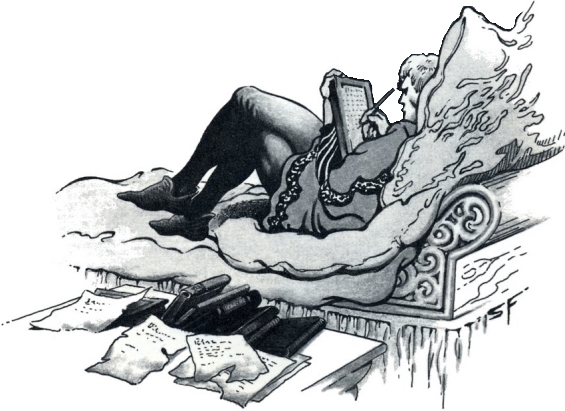
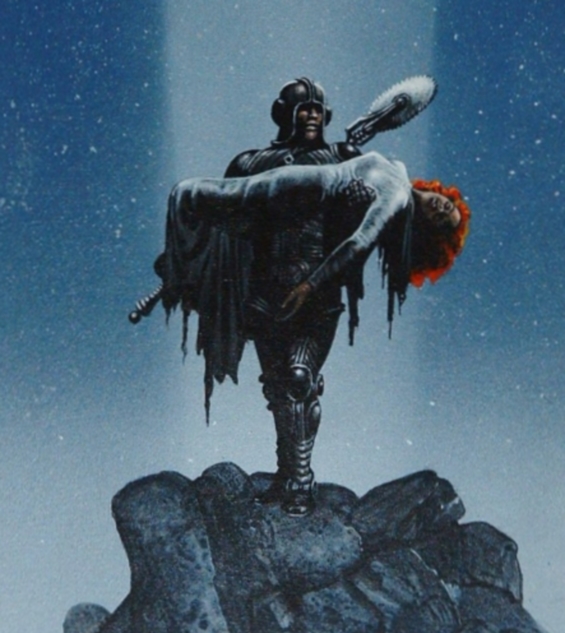
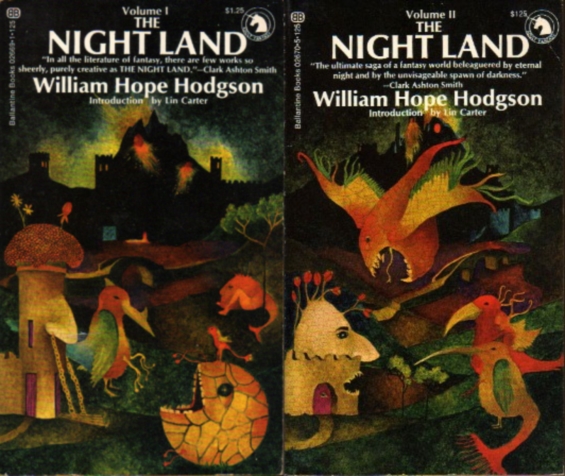
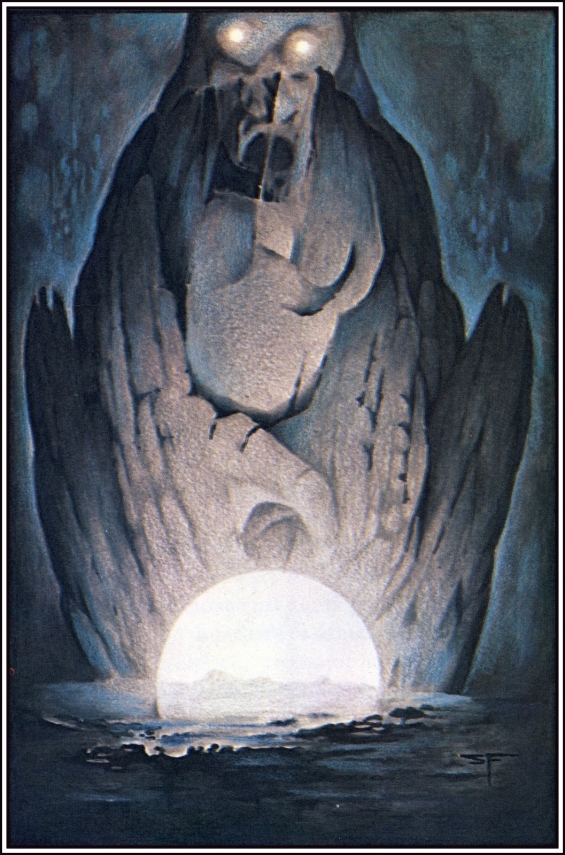
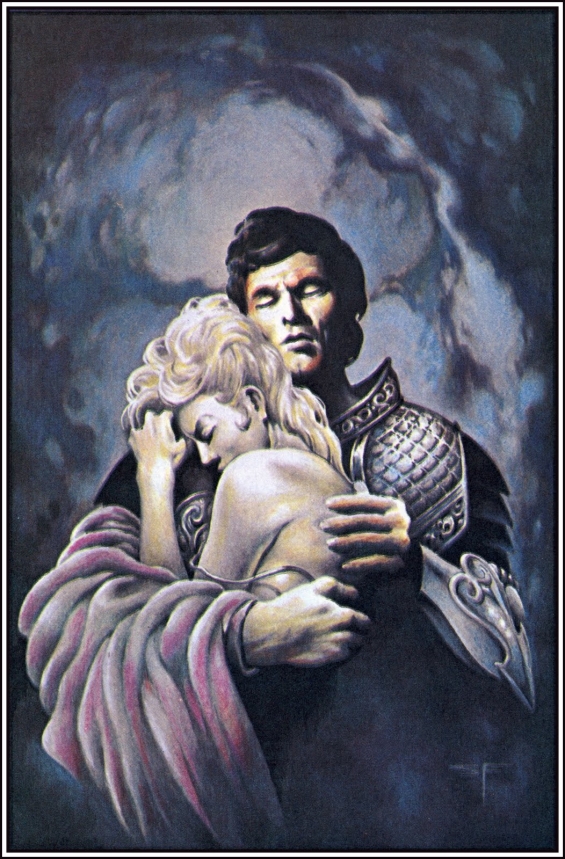
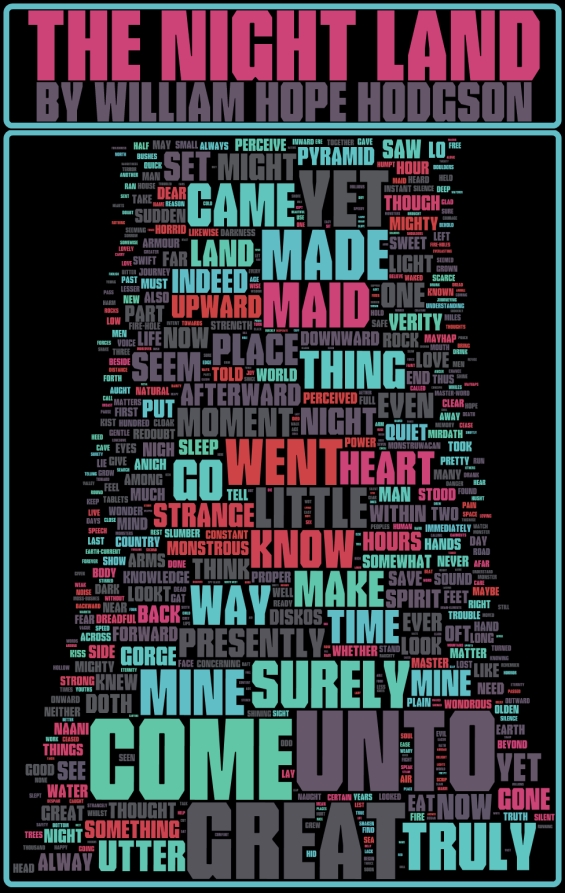
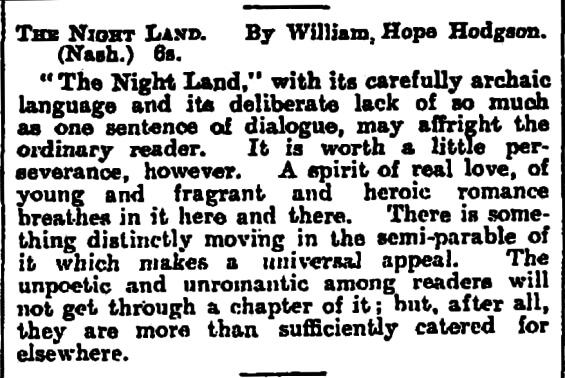
Posted by Jesse Willis

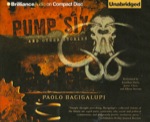





 There’s a new great narrator working over on
There’s a new great narrator working over on 